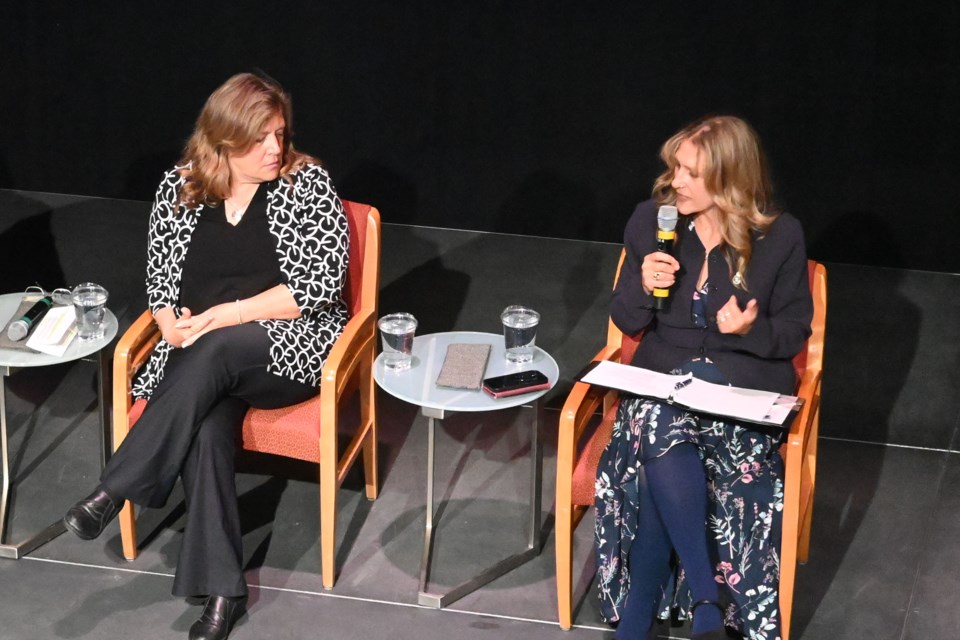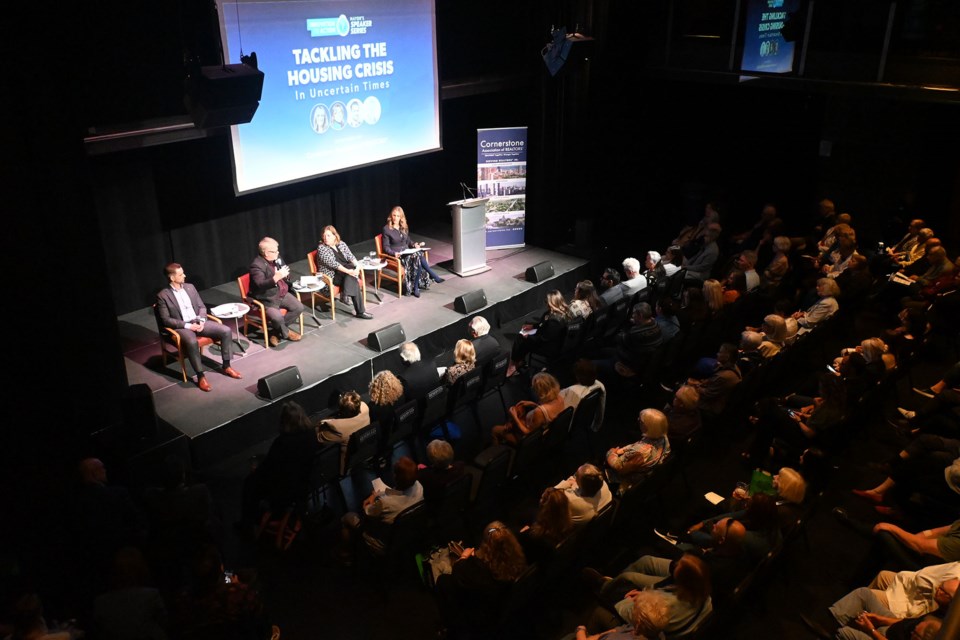Mayor Marianne Meed Ward hosted a panel of housing industry experts at the Burlington Performing Arts Centre last night (May 26) during a Mayor Speak’s series event titled ‘Tackling the Housing Crisis in Uncertain Times.’
The mayor was joined by Ward 4 councillor Shawna Stolte, chair of West End Builders Association David Ionico and Jim Dunn, an Associate Dean at McMaster University and director of Canadian Housing Evidence Collaborative for the panel, which focused around affordable housing, homelessness, the housing market and more.
Councillors Angelo Bentivegna and Paul Sharman were present in the audience for the panel alongside Gary Carr, the current chair of the Regional Municipality of Halton.
Meed Ward opened the panel by speaking about her recent study tour in Helsinki, Finland, where the city had made a commitment to ending homelessness across the country. Helsinki had more than 1,600 homeless individuals and 130 homeless families in 2019, but has housed every family and around 900 homeless people since then.

“We need political will and a range of options for people,” Meed Ward said. “From emergency shelters to bring you out of the cold so you don’t freeze on the streets to supporting housing with rent geared to income, and we need more government loans to build mixed housing environments to not segregate people by income.”
Dunn, who has held talks on homelessness and the housing crisis across Halton, added that the best way to fight homelessness was to prevent people from becoming homeless in the first place by expanding support options.
“Every homeless person was once a housed person in distress,” Dunn said. “The vast majority of people facing homelessness is because of affordability, and we often talk about how we have to build them a house. We don’t need to build a house, they don’t have a housing problem, they have an income problem. If we can provide expanded housing benefits that are cheaper and more immediate than spending three years building a home, we can make an impact.”
The panel also spoke on the city’s Pipeline to Permit committee, a unique committee made up of city councillors, representatives from organizations like the West End Builders Association and Habitat for Humanity and local Burlington residents that discusses the best ways to create new local housing opportunities.
“We need to hear from those voices, otherwise we’re speaking in a vacuum,” Stolte said. “We can get more work done because, if it were entirely councillors, we’d have to go out and do public engagement with these stakeholders as opposed to having them at the table to make the decisions with us.”
Despite the city’s work to speed up the building of new homes and residential units, property sales have dropped significantly from this time last year even as housing prices rose.
“The biggest issue right now is simply market uncertainty and fear of investment,” Ionico said. “We’re seeing projects that aren’t getting off the ground, capital not being deployed and investors and home buyers aren’t willing to get off the fence and start buying. The tariffs have exacerbated it and have likely prolonged the doom and gloom of the real estate industry.”
Talk of tariffs came up several times throughout the evening, and Ionico stressed how much of a problem they could be for the development of new housing across the country.
“Last year, we were thinking it couldn’t get any worse,” he said. “Boy, were we wrong. Tariffs are going to create significant impacts, there will be trade and supply disruptions and raw material price increases that will affect the product being made in Canada.”
Attendees were given the chance to ask questions of the panel at the end of the event, with one resident asking about what powers the city had to increase the number of affordable residential units included in large-scale developments, such as the Bronte Creek Meadows project.
“We used to have more sway than what we have now,” Stolte said. “Provincial policy has changed over the years, and it gives us less push to be able to demand affordable units. Now it’s a matter of negotiation, trying to find opportunities to partner with and incentivize builders. We need to find ways to be creative and innovative to cut costs for the builders so they can offer us affordable housing units that we can offer to the community.”
Residents could also connect with a number of local organizations ahead of the panel discussion, including Feed Halton, Indwell, Habitat for Humanity, Home Suite Hope, Woodview Mental Health and more.



